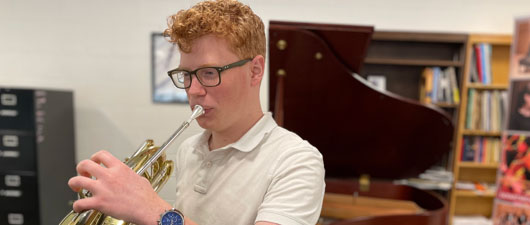 Pictured | Robert Compton | B. A. in Music | Bremen, Indiana (hometown)
Pictured | Robert Compton | B. A. in Music | Bremen, Indiana (hometown)
Photo provided by the Ernestine M. Raclin School of the Arts
Bachelor of Arts in Music
The Bachelor of Arts (B.A.) in Music at IU South Bend is a liberal arts degree program with a major in music and a degree focus that combines general education with studies in musicianship and allow students to tailor their degree for their future endeavors.
Academic Advising
The Ernestine M. Raclin School of the Arts policy on advising requires that students meet with their academic advisors each semester prior to registration. Advising holds are placed on all Music students prior to advance registration and are released following advising appointments. Students with a declared major in Music are advised by Music faculty. Additionally, you may have a secondary advisor if you have also declared a minor, although a minor is not required for a degree in the Music. You can verify your assigned advisor in the student center in One.IU.
Degree Requirements (120 cr.)
Degree Map >>
Students receiving the Bachelor of Art Education degree must complete 120 total credit hours including:
- IU South Bend Campuswide General Education Curriculum (33 cr.) | 3 credits are satisfied by a course from the Major
- MUS-M 201 The Literature of Music 1
Fulfills the Additional Requirements: Information Literacy requirement
- Major Requirements (50 cr.)
- Core Musicianship (25 cr.)
- Piano Proficiency (4 cr.)
- Applied Music (8 cr.)
- Ensemble (8 cr.)
- Other Music (2 cr.)
- World Languages (6 cr.)
- Music Electives (16 cr.)
- Non-Music General Electives (15 cr.)
- A minimum of 30 credit hours at the 300– or 400–level.
- Courses required for the major must be completed with a grade of C– or higher.
- A minimum CGPA of 2.0 is required.
- All courses are 3 credit hours, unless otherwise noted.
Major Requirements (50 cr.)
Core Musicianship (25 cr.)
Music Theory and History
- MUS-M 201 The Literature of Music 1
Fulfills Additional Requirements: Information Literacy - MUS-M 202 The Literature of Music 2
- MUS-M 430 Introduction to Contemporary Music
- MUS-T 113 Music Theory I
- MUS-T 114 Music Theory II
- MUS-T 115 Sightsinging and Aural Perception I (1 cr.)
- MUS-T 116 Sightsinging and Aural Perception II (1 cr.)
- MUS-T 213 Music Theory III
- MUS-T 214 Music Theory IV
- MUS-T 215 Sightsinging and Aural Perception III (1 cr.)
- MUS-T 216 Sightsinging and Aural Perception IV (1 cr.)
Other Music Requirements (3 cr.)
- MUS-I 100 Cultural Events Attendance (0 cr.) (eight semesters; or every semester of enrollment for transfer students)
- MUS-T 120 Computer Skills for Musicians
- MUS-U 310 Performance Laboratory (0 cr.) (each semester prior to passing Upper-Divisional Examination)
- MUS-X 296 Applied Music Upper-Divisional Jury Examination (0 cr.)
Piano Proficiency (4 cr.)
Select one of the following options:
Option 1
- MUS-P 101 Piano Class 1 (1 cr.)
- MUS-P 102 Piano Class 2 (1 cr.)
- MUS-P 103 Piano Class 3 (1 cr.)
- MUS-P 104 Piano Class 4 (1 cr.)
- MUS-P 105 Keyboard Proficiency (0 cr.)
Option 2 (when piano is primary instrument)
- MUS-P 105 Keyboard Proficiency (0 cr.)
- Secondary Instrument at 200 level (2 cr. ) (two semesters)
Applied Music (8 cr.)
- MUS-_ 200 Principal Instrument/Voice (1 cr. each semester)
Ensemble (8 cr.)
Select one of the following during every semester of enrollment:
- MUS-X 002 Piano Accompanying (1 cr.)
- MUS-X 040 University Instrumental Ensembles (1 cr.)
- MUS-X 070 University Choral Ensembles (1 cr.)
- MUS-X 350 Jazz Ensembles (1 cr.)
Other Music (2 cr.)
- MUS-I 421 Bachelor of Arts Senior Thesis (2 cr.)
Music Electives (16 cr.)
- At least 6 credits at the 300–level or above.
- No more than 6 credits in applied music.
Non-Music General Electives (15 cr.)
- At least 6 credits at the 200–level or above.
World Languages (6 cr.)
- Two semesters of languages (may be satisfied with world languages placement test and credit by examination)